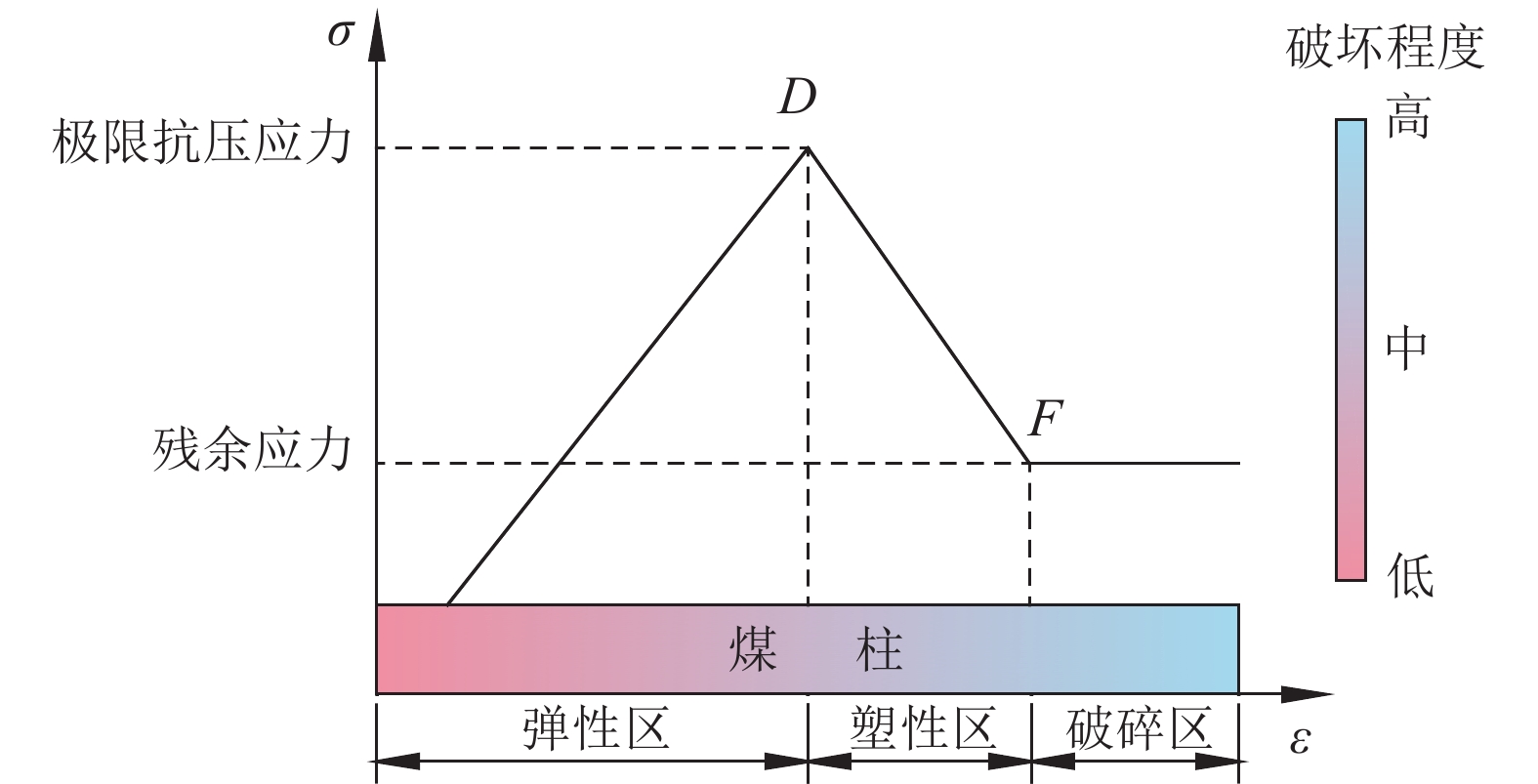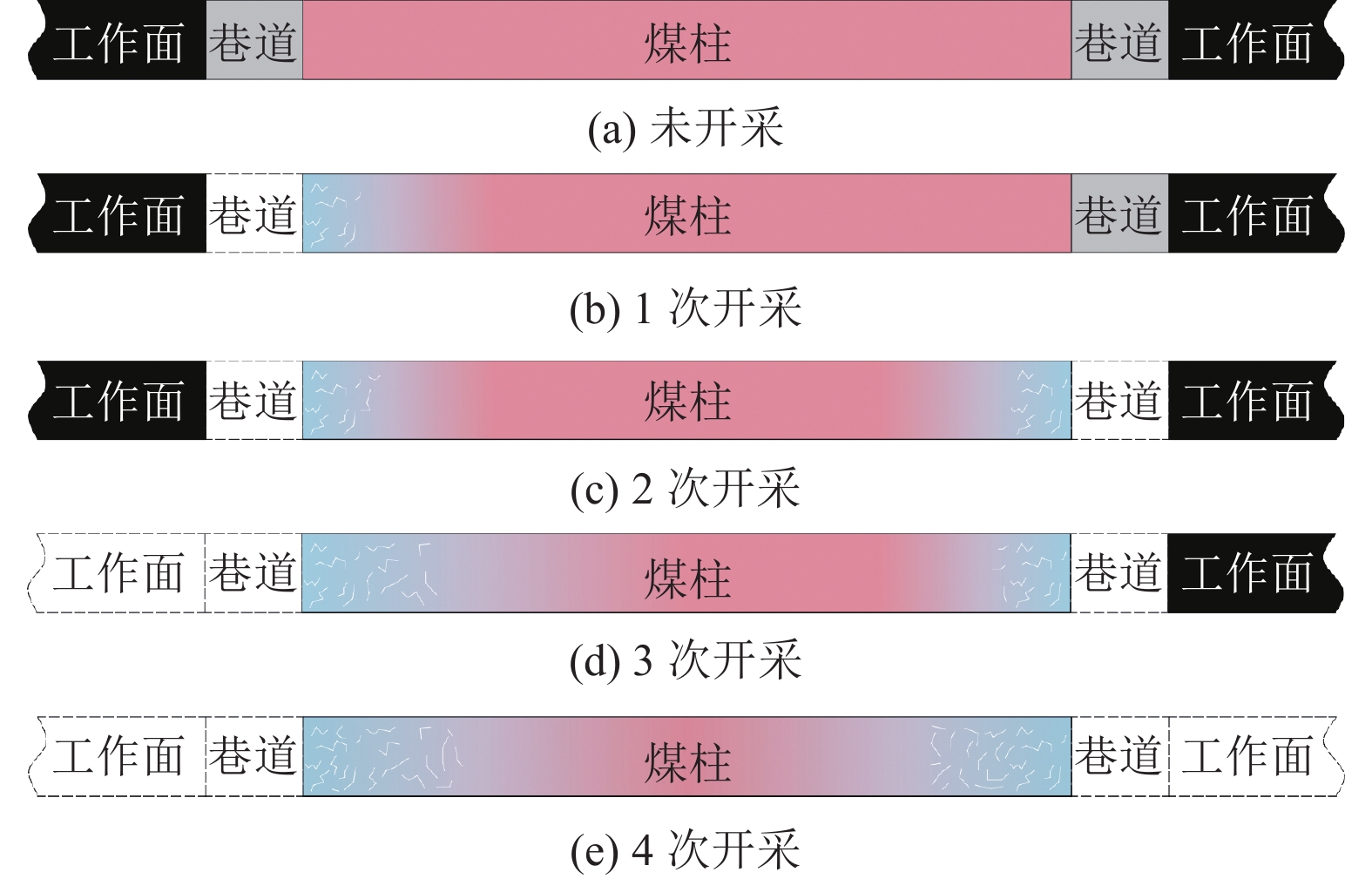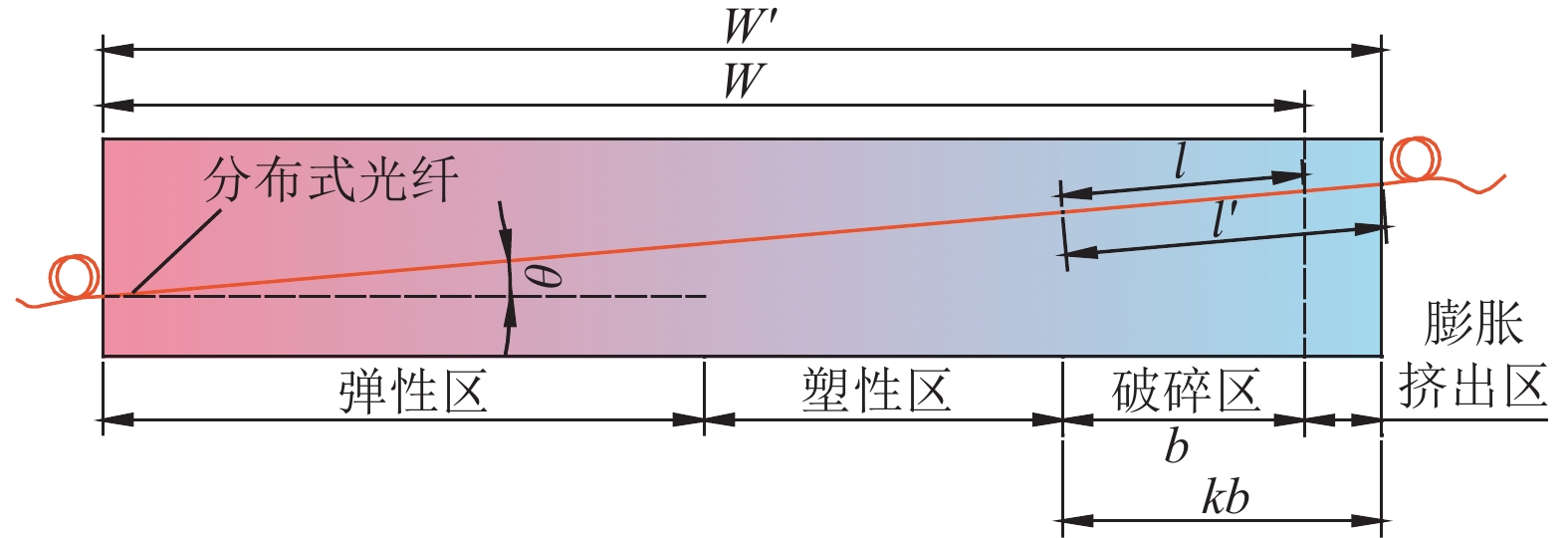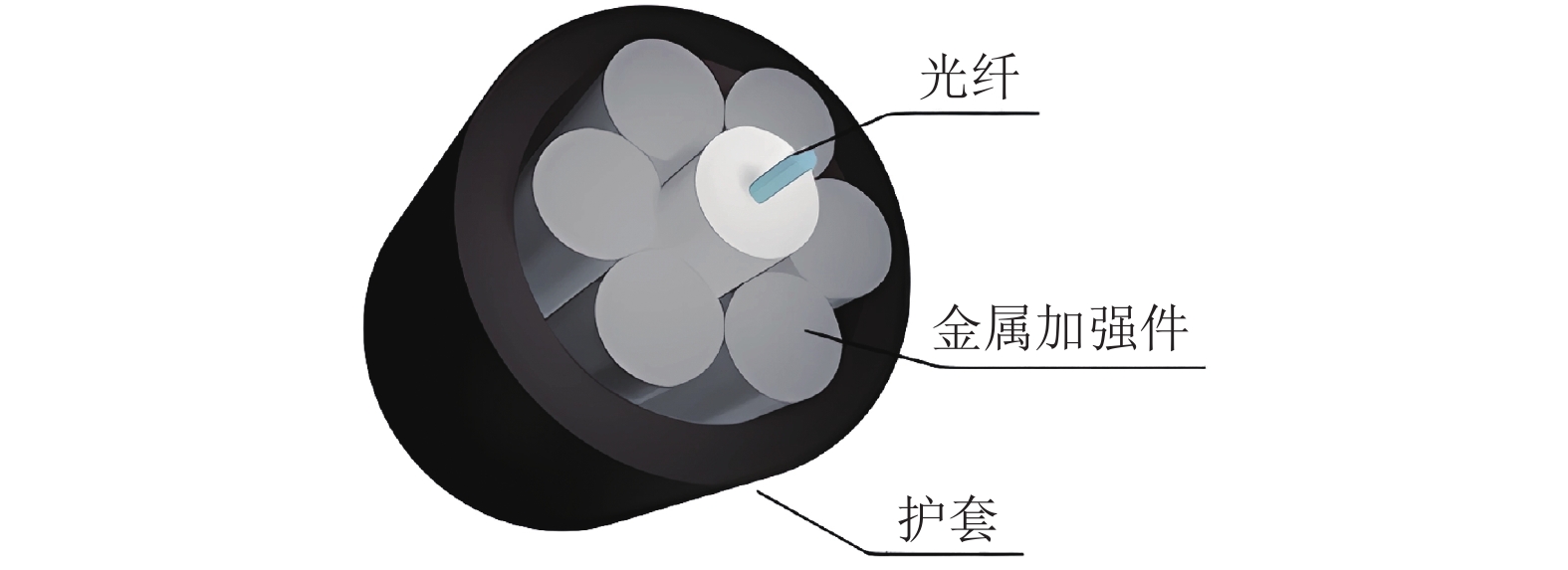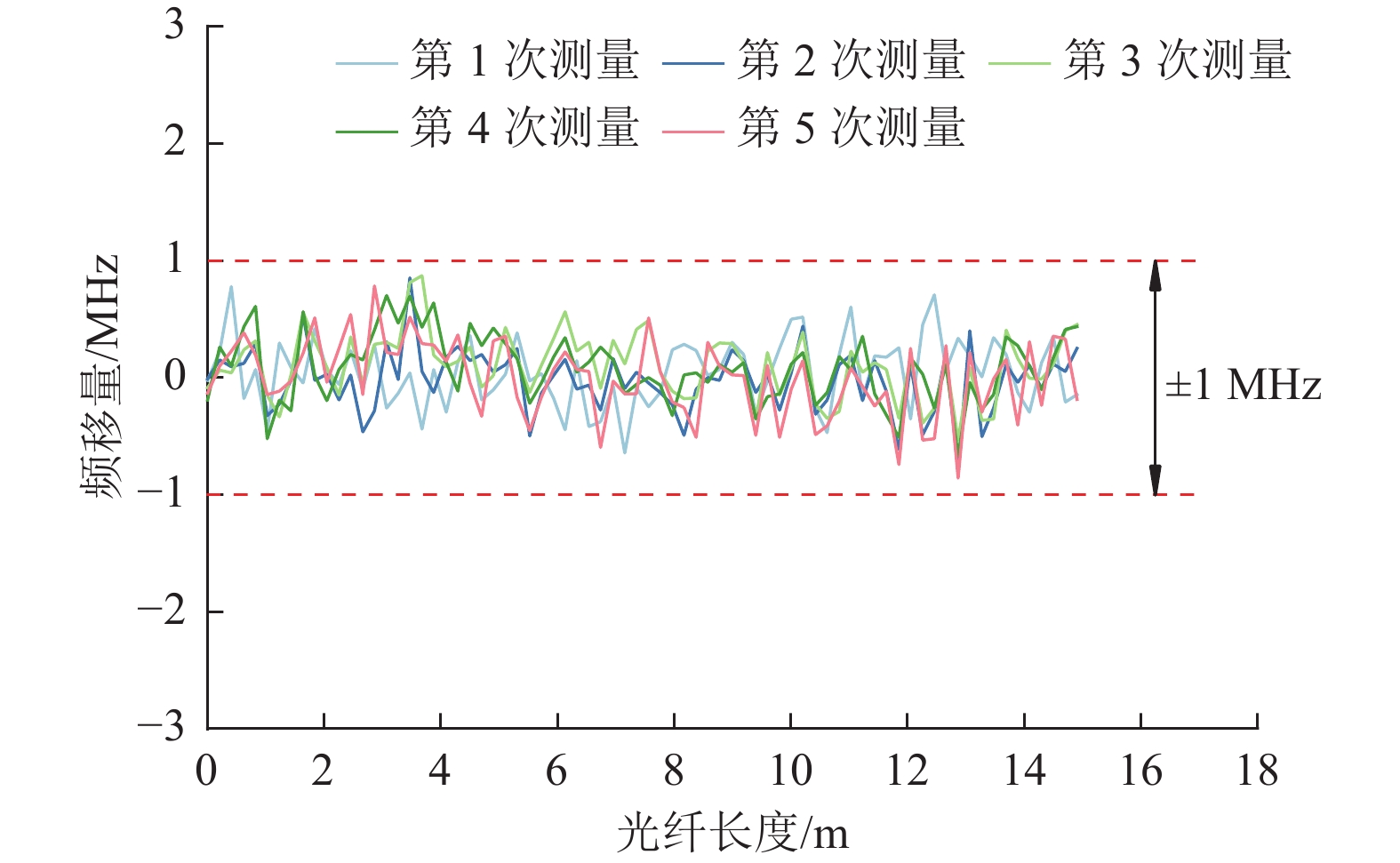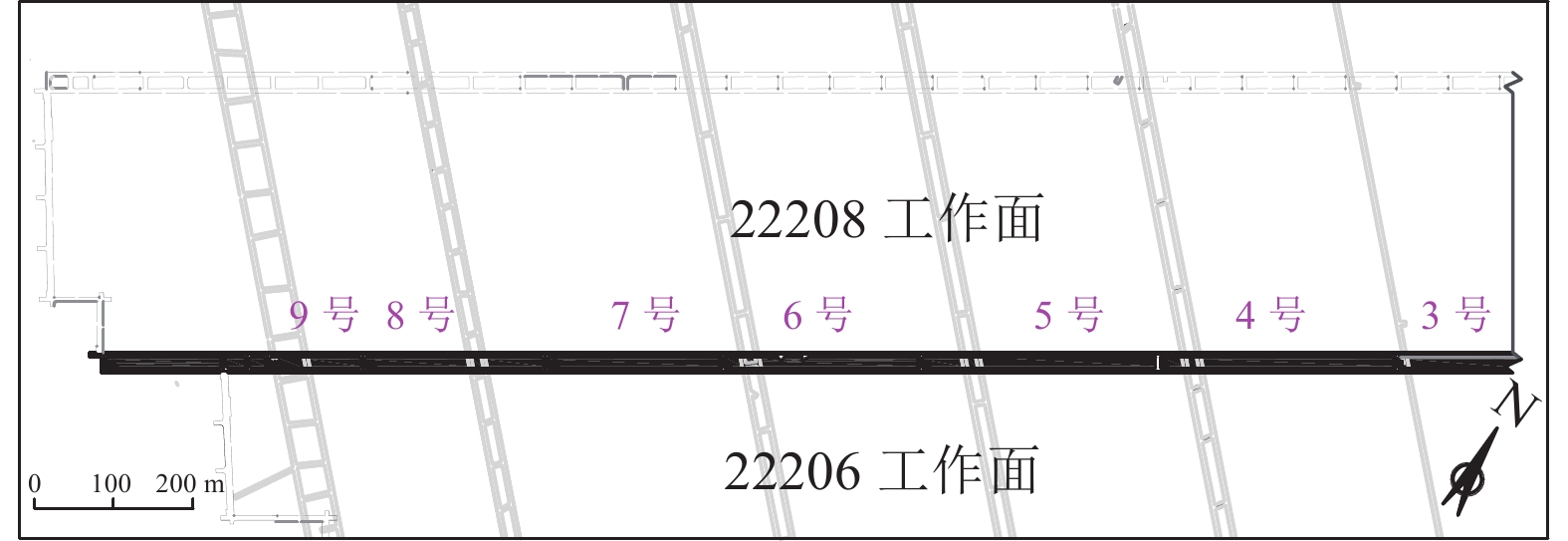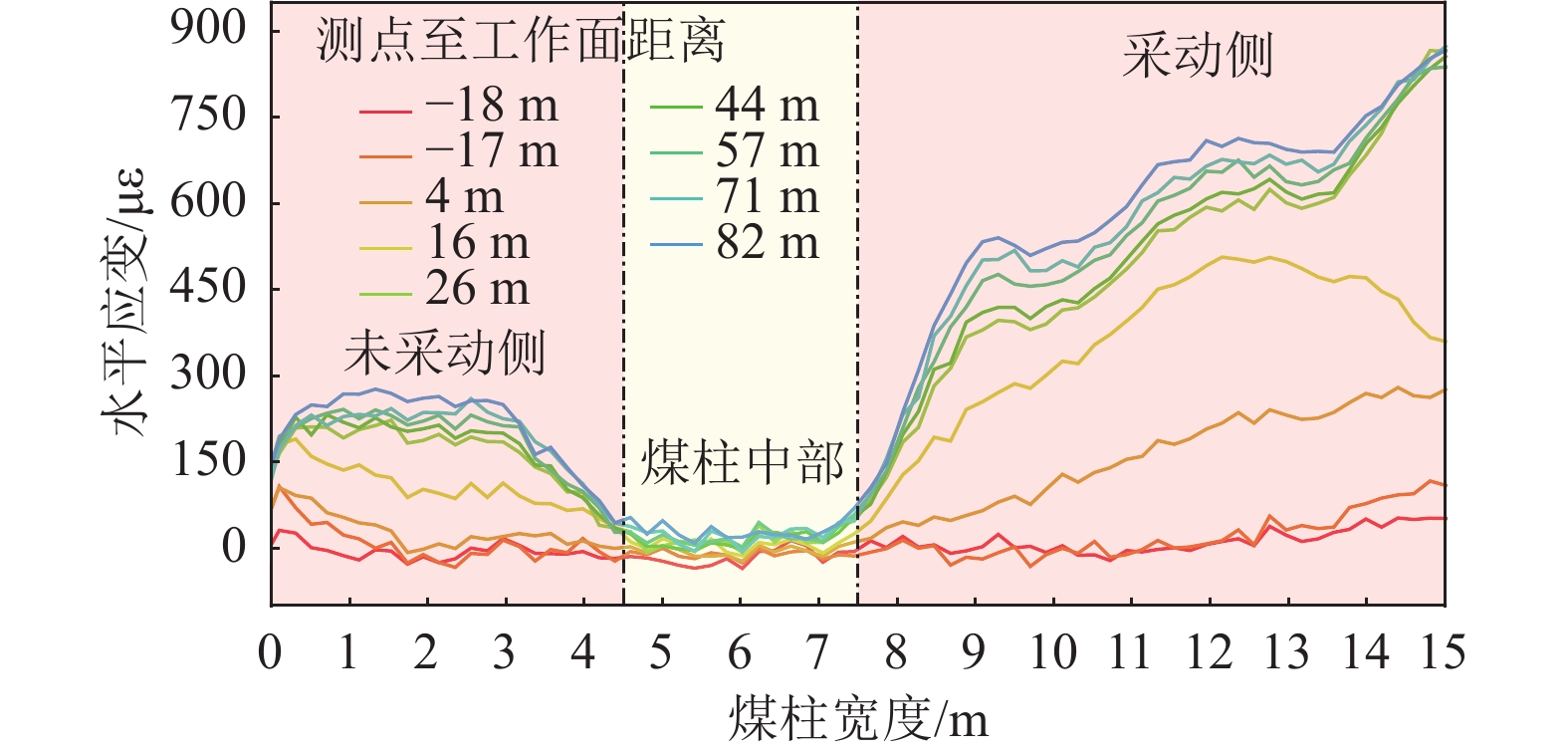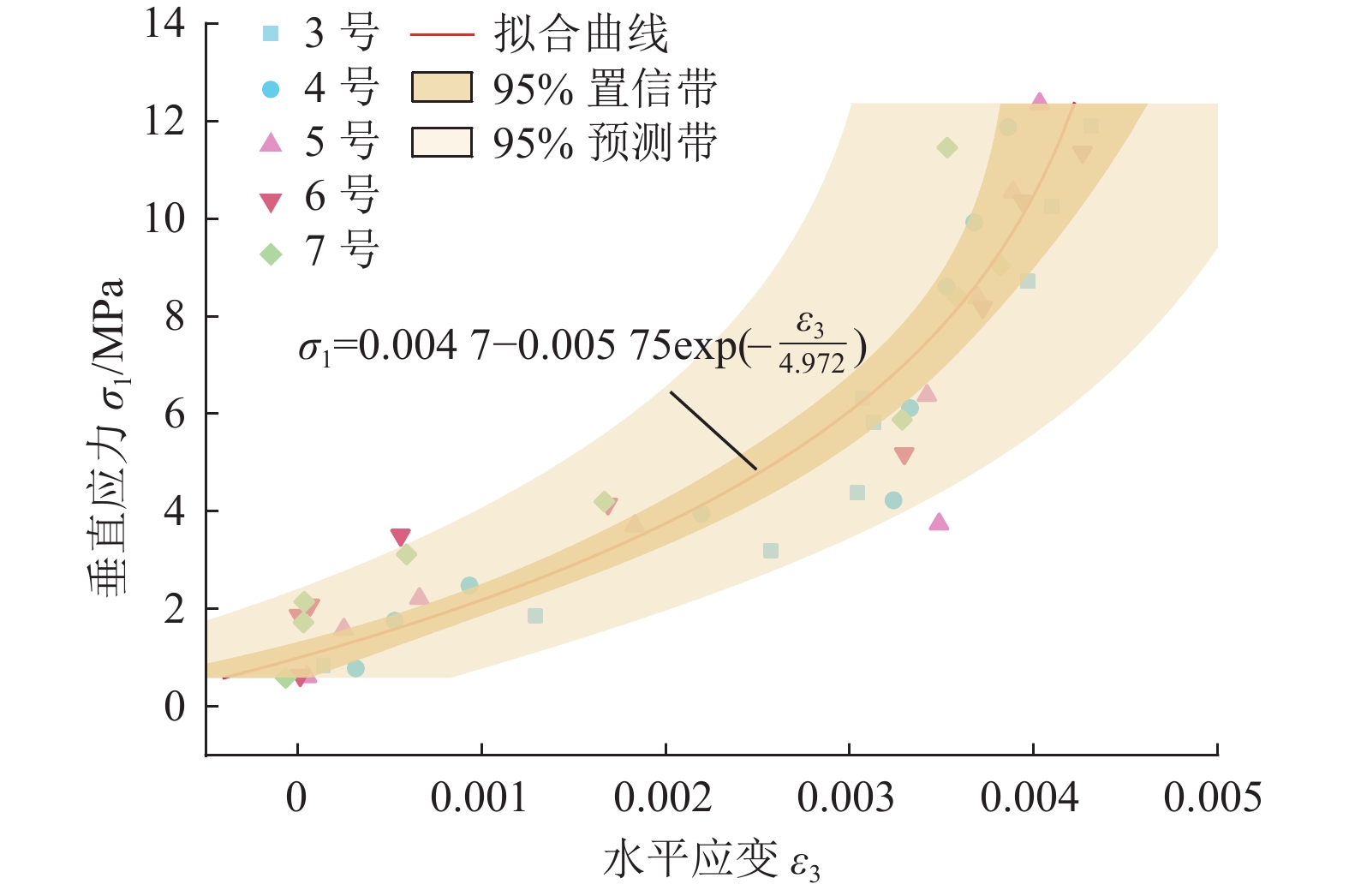-
摘要:
针对煤柱内部微裂纹萌生、变形破坏等潜在安全隐患,利用布里渊光时域反射(BOTDR)分布式光纤传感技术进行煤柱水平变形监测。首先,根据煤柱破坏碎胀特性理论分析,建立了光纤轴向应变与水平变形的转化方法;其次开展室内试验确定了金属基索状传感光纤轴向拉伸响应情况,并根据煤柱变形破坏规律修正了应变系数,最后以陕西大柳塔煤矿活鸡兔井为工程背景,对22206工作面区段煤柱水平变形实现现场监测。监测结果表明:区段煤柱采动侧和未采动侧存在明显的水平变形差异,采动侧变形量最大,约为未采动侧的5倍,但煤柱整体水平变形较小,仅出现弹性变形,煤柱较稳定;煤柱变形分区明显,呈现中部为弹性核区,两侧为塑性破坏区的分区特征;工作面从测点前20 m推进至测点后40 m时,煤柱水平应变呈指数增长,远离测点之后变形趋于稳定,反映煤柱变形与采动应力扰动之间的动态关联;通过分析煤柱水平应变与垂直应力,发现两者呈指数相关关系,定量建立了煤柱水平应变与垂直应力关系式,说明煤柱变形与破坏很大程度上取决于采动应力的分布与演化。利用BOTDR技术对区段煤柱内部变形进行监测可以精确获取区段煤柱内部的微观变形信息,对于煤柱留设尺寸确定、围岩控制及采空区压力评估等具有重要指导意义。
Abstract:To address potential safety hazards like microcrack initiation, deformation, and failure inside coal pillars, this study monitored the horizontal deformations of coal pillars using the Brillouin optical time-domain reflectometry (BOTDR)—a distributed optical fiber sensing technology. Firstly, this study established a method for converting the axial strain of optical fibers into horizontal deformations based on a theoretical analysis of the failure and bulking characteristics of coal pillars. Secondly, it determined the axial tensile response of metal-based cord-shaped sensing optical fibers by conducting laboratory tests. Then, it corrected the strain coefficient based on the deformation and failure patterns of coal pillars. Finally, against the engineering background of the Huojitu well of the Daliuta coal mine in Shaanxi Province, this study implemented on-site monitoring of the horizontal deformations of section coal pillars in mining face 22206. The key results are as follows: (1) Significant differences in horizontal deformations were observed between the mining and non-mining sides of section coal pillars. Specifically, the mining sides exhibited the largest horizontal deformation, about five times that of the non-mining sides. However, coal pillars manifested minor overall horizontal deformation characterized by only elastic deformation, suggesting relatively stable coal pillars. (2) Coal pillars displayed significant deformation zones, presenting an elastic core zone in the central part but plastic failure zones on both sides. (3) As the mining face advances from 20 m in front of the measurement ponit to 40 m behind the messurement point, the horizontal strain of coal pillars increased exponentially, and after moving away from survey points, the deformations tended to stabilize, reflecting a dynamic link between coal pillar deformations and mining-induced stress disturbance. (4) A analysis on the horizontal strain and vertical stress of coal pillars revealed an exponential relationship between both, forming a quantitative relationship between both. The result indicates that the deformations and failure of coal pillars largely depend on the distribution and evolution of mining-induced stress. Overall, the BOTDR-based monitoring of the deformations inside section coal pillars can yield accurate information on microdeformations inside section coal pillars, serving as an important guide for determining coal pillar sizes, controlling surrounding rocks, and evaluating pressure in goaves.
-
-
表 1 光纤拉拔加卸载试验设计
Table 1 Loading and unloading sequences during optical fiber pull-out
阶段 序号 1 000 mm传感光纤 1500 mm传感光纤 位移/mm 应变/10−6 位移/mm 应变/10−6 加载阶段 1 3.0 3 000 4.50 3 000 2 3.5 3 500 5.25 3 500 3 4.0 4 000 6.00 4 000 4 4.5 4 500 6.75 4 500 5 5.0 5 000 7.50 5 000 卸载阶段 6 4.5 4 500 6.75 4 500 7 4.0 4 000 6.00 4 000 8 3.5 3 500 5.25 3 500 9 3.0 3 000 4.50 3 000 表 2 2−2煤层岩石力学参数
Table 2 Rock mechanical parameters of the 2−2 coal seam
参数 数值 体积模量/GPa 0.74 剪切模量/GPa 0.43 黏聚力/GPa 1.3 内摩擦角/(°) 30 密度/(kg·m−3) 2 400 厚度/m 4.04~5.20 倾角/(°) 1~3 坚固性系数f 2.98 层理 中等发育 节理 中等发育 温度/℃ 18.8 湿度/% 64.2 -
[1] 庞义辉,张国军,王泓博,等. 综放工作面区段煤柱采动应力全周期时空演化分析[J]. 岩石力学与工程学报,2023,42(4):833−848. PANG Yihui,ZHANG Guojun,WANG Hongbo,et al. Mining stress full–cycle temporal and spatial evolution analysis on section coal pillar of fully–mechanized caving face[J]. Chinese Journal of Rock Mechanics and Engineering,2023,42(4):833−848.
[2] 秦汝祥,杨科,刘帅,等. 区段煤柱渗透性分析与防火效应研究[J]. 采矿与安全工程学报,2018,35(3):629−634. QIN Ruxiang,YANG Ke,LIU Shuai,et al. Study on permeability and fire proof effectiveness of sectional coal pillar[J]. Journal of Mining & Safety Engineering,2018,35(3):629−634.
[3] 韩刚,王黔,吕玉磊. 区段煤柱对沿空巷道动力显现影响机制研究[J]. 煤炭科学技术,2022,50(增刊2):153–159. HAN Gang,WANG Qian,LYU Yulei. Study on influence mechanism of section coal pillar on dynamic behavior of roadway along goaf[J]. Coal Science and Technology,2022,50(Sup.2):153–159.
[4] 王博,冯国瑞,姜福兴. 陕蒙深部矿区基于防冲的区段煤柱宽度研究[J]. 太原理工大学学报,2023,54(3):443−450. WANG Bo,FENG Guorui,JIANG Fuxing. Research on segment coal pillar width based on rock burst prevention in Shaanxi–inner Mongolia deep mines[J]. Journal of Taiyuan University of Technology,2023,54(3):443−450.
[5] 刘世奇,张村,曾一凡,等. 蓄水采空区区段煤柱采动水浸弱化机制与失稳特征[J]. 采矿与安全工程学报,2022,39(6):1084−1094. LIU Shiqi,ZHANG Cun,ZENG Yifan,et al. Weakening mechanism and instability characteristics of coal pillar under mining disturbance and water immersion in water storage goaf[J]. Journal of Mining & Safety Engineering,2022,39(6):1084−1094.
[6] 牛滕冲,王方田,王文林,等. 区段煤柱聚能失稳关键因素及控制技术[J]. 采矿与岩层控制工程学报,2022,4(2):24−34. NIU Tengchong,WANG Fangtian,WANG Wenlin,et al. Key factors and control technology of energy–gathered instability of coal pillar[J]. Journal of Mining and Strata Control Engineering,2022,4(2):24−34.
[7] KAJZAR V,KUKUTSCH R,WACLAWIK P,et al. Innovative approach to monitoring coal pillar deformation and roof movement using 3D laser technology[J]. Procedia Engineering,2017,191:873−879. DOI: 10.1016/j.proeng.2017.05.256
[8] 任建喜,林海,易归,等. 浅埋综采工作面区段煤柱宽度优化[J]. 科学技术与工程,2022,22(14):5562−5568. REN Jianxi,LIN Hai,YI Gui,et al. Optimization of coal pillar width in shallow–buried fully–mechanized coal face[J]. Science Technology and Engineering,2022,22(14):5562−5568.
[9] 郑仰发,鞠文君,康红普,等. 基于三维应变动态监测的大采高综采面区段煤柱留设综合试验研究[J]. 采矿与安全工程学报,2014,31(3):359−365. ZHENG Yangfa,JU Wenjun,KANG Hongpu,et al. Combined test research on coal pillar width setting of district sublevel for fully–mechanized face with large mining height based on 3D dynamic strain monitoring[J]. Journal of Mining & Safety Engineering,2014,31(3):359−365.
[10] 王高昂,朱斯陶,姜福兴,等. 倾斜厚煤层综放工作面煤柱–关键层结构失稳型矿震机理[J]. 煤炭学报,2022,47(6):2289−2299. WANG Gao’ang,ZHU Sitao,JIANG Fuxing,et al. Seismic mechanism of coal pillar–key layer structure in fully mechanized caving face of inclined thick coal seam[J]. Journal of China Coal Society,2022,47(6):2289−2299.
[11] 张明,姜福兴,李克庆,等. 巨厚岩层–煤柱系统协调变形及其稳定性研究[J]. 岩石力学与工程学报,2017,36(2):326−334. ZHANG Ming,JIANG Fuxing,LI Keqing,et al. Study of the compatible deformation and stability of the system of super thick strata and coal Pillars[J]. Chinese Journal of Rock Mechanics and Engineering,2017,36(2):326−334.
[12] SONG Chunhui,LU Caiping,ZHANG Xiufeng,et al. Moment tensor inversion and stress evolution of coal pillar failure mechanism[J]. Rock Mechanics and Rock Engineering,2022,55(4):2371−2383. DOI: 10.1007/s00603-022-02783-1
[13] 程刚,王振雪,施斌,等. DFOS在矿山工程安全开采监测中的研究进展[J]. 煤炭学报,2022,47(8):2923−2949. CHENG Gang,WANG Zhenxue,SHI Bin,et al. Research progress of DFOS in safety mining monitoring of mines[J]. Journal of China Coal Society,2022,47(8):2923−2949.
[14] 张平松,许时昂,郭立全,等. 采场围岩变形与破坏监测技术研究进展及展望[J]. 煤炭科学技术,2020,48(3):14−48. ZHANG Pingsong,XU Shiang,GUO Liquan,et al. Prospect and progress of deformation and failure monitoring technology of surrounding rock in stope[J]. Coal Science and Technology,2020,48(3):14−48.
[15] 柴敬,彭钰博,马伟超,等. 煤柱应力应变分布的光纤监测试验研究[J]. 地下空间与工程学报,2017,13(1):213−219. CHAI Jing,PENG Yubo,MA Weichao,et al. Research on optical fiber sensing monitoring experiment of stress–strain distribution in section coal pillar[J]. Chinese Journal of Underground Space and Engineering,2017,13(1):213−219.
[16] 柴敬,王佳琪,杨健锋,等. 区段煤柱变形光纤光栅监测应用研究[J]. 煤炭科学技术,2024,52(1):126−137. CHAI Jing,WANG Jiaqi,YANG Jianfeng,et al. Research on the application of fiber Bragg grating monitoring for deformation of coal pillar in sections[J]. Coal Science and Technology,2024,52(1):126−137.
[17] 侯公羽,谢冰冰,江玉生,等. 用于巷道沉降变形监测的光纤锯齿状布设技术与原理[J]. 岩土力学,2017,38(增刊1):96−102. HOU Gongyu,XIE Bingbing,JIANG Yusheng,et al. Sawtooth layout technology and principle of fiber used in deformation monitoring of roadway subsidence[J]. Rock and Soil Mechanics,2017,38(Sup.1):96−102.
[18] 李延河,杨战标,朱元广,等. 基于弱光纤光栅传感技术的围岩变形监测研究[J]. 煤炭科学技术,2023,51(6):11−19. LI Yanhe,YANG Zhanbiao,ZHU Yuanguang,et al. Research on deformation monitoring of surrounding rock based on weak fiber grating sensing technology[J]. Coal Science and Technology,2023,51(6):11−19.
[19] XU Shiang,ZHANG Pingsong,ZHANG Dan,et al. Simulation study of fiber optic monitoring technology of surrounding rock deformation under deep mining conditions[J]. Journal of Civil Structural Health Monitoring,2015,5(5):563−571. DOI: 10.1007/s13349-015-0125-8
[20] TANG Bin,CHENG Hua. Application of distributed optical fiber sensing technology in surrounding rock deformation control of TBM–excavated coal mine roadway[J]. Journal of Sensors,2018,2018:8010746.
[21] 李永倩,王少康,华子明,等. 布里渊温度和压力传感器增敏设计[J]. 半导体光电,2021,42(5):624−629. LI Yongqian,WANG Shaokang,HUA Ziming,et al. Sensitization design of Brillouin temperature and pressure sensor[J]. Semiconductor Optoelectronics,2021,42(5):624−629.
[22] 周会娟,廖毅,孟洲. 基于布里渊散射的分布式光纤传感技术[J]. 光学技术,2008,34(增刊1):251−253. ZHOU Huijuan,LIAO Yi,MENG Zhou. Distributed optical fiber sensing based On brillonin scattering[J]. Optical Technique,2008,34(Sup.1):251−253.
[23] 闫继送,袁明,张志辉,等. 基于拉伸装置的光纤应变系数标定及误差分析[J]. 光电工程,2014,41(1):23−28. YAN Jisong,YUAN Ming,ZHANG Zhihui,et al. Calibration and error analysis of strain coefficient of optical fiber based on stretching device[J]. Opto–Electronic Engineering,2014,41(1):23−28.
[24] 耿伟乐,董子文,郭胜利,等. 深部高应力巷道变形特性与支护时机[J]. 煤田地质与勘探,2019,47(6):126−134. GENG Weile,DONG Ziwen,GUO Shengli,et al. Deformation characteristics and support timing of deep high stress roadway[J]. Coal Geology & Exploration,2019,47(6):126−134.
[25] 尹尚先,孟浩鹏,钱双彬. 考虑围岩应变软化及采空区接触的深部煤层底板破坏分析[J]. 煤田地质与勘探,2022,50(5):95−102. DOI: 10.12363/issn.1001-1986.21.09.0474 YIN Shangxian,MENG Haopeng,QIAN Shuangbin. Failure analysis of deep coal seam floor considering strain softening of surrounding rock and formation contact in goaf[J]. Coal Geology & Exploration,2022,50(5):95−102. DOI: 10.12363/issn.1001-1986.21.09.0474
[26] 徐青云,黄庆国,张广超. 综放剧烈采动影响煤巷窄煤柱破裂失稳机理与控制技术[J]. 采矿与安全工程学报,2019,36(5):941−948. XU Qingyun,HUANG Qingguo,ZHANG Guangchao. Fracture and instability mechanism and control technology of a narrow coal pillar in an entry in fully mechanized caving mining under intense effect mining[J]. Journal of Mining & Safety Engineering,2019,36(5):941−948.
[27] 康红普. 我国煤矿巷道围岩控制技术发展70年及展望[J]. 岩石力学与工程学报,2021,40(1):1−30. KANG Hongpu. Seventy years development and prospects of strata control technologies for coal mine roadways in China[J]. Chinese Journal of Rock Mechanics and Engineering,2021,40(1):1−30.







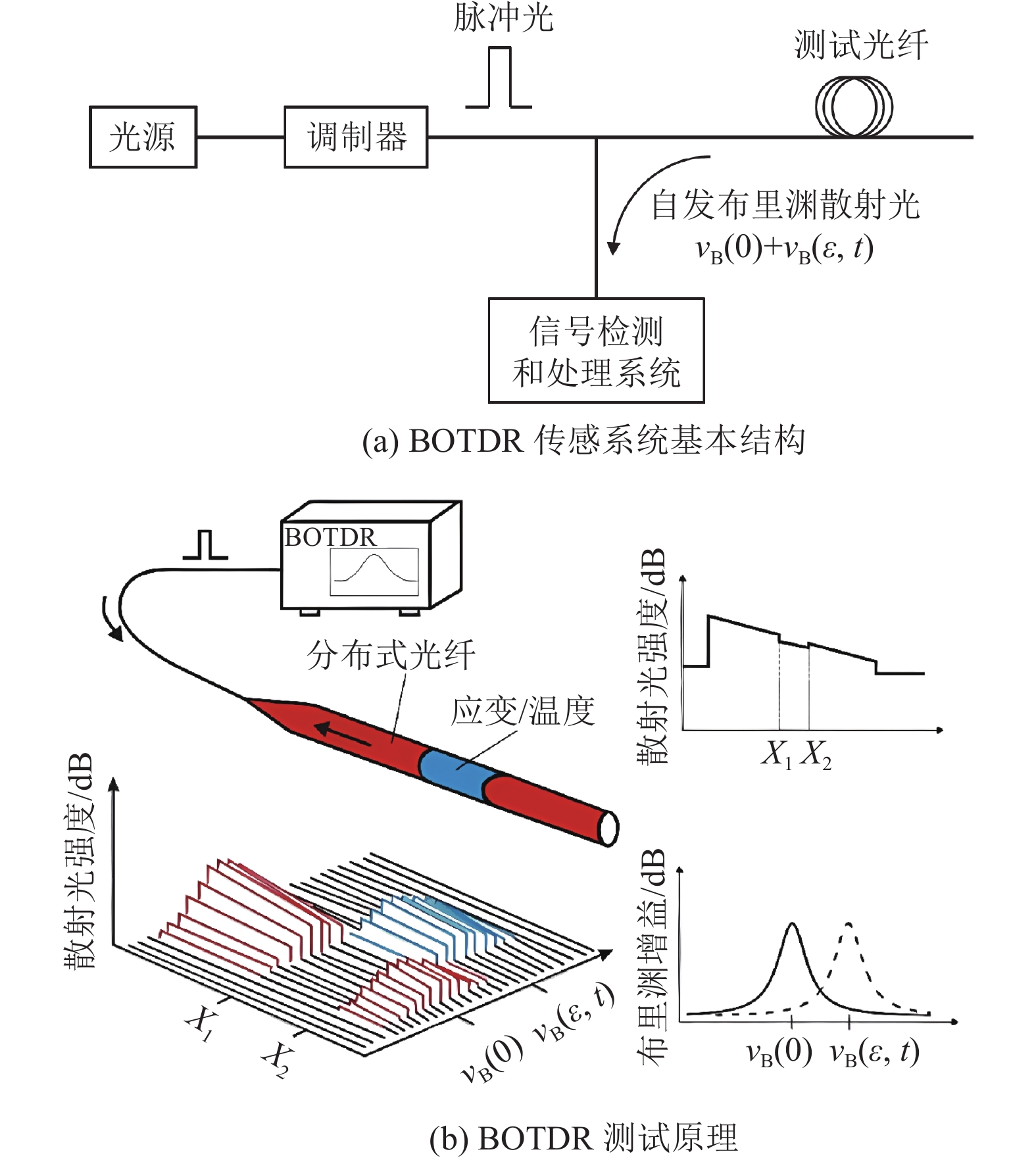
 下载:
下载:
